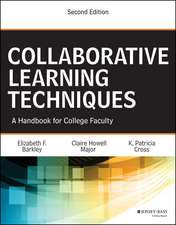Learning to Teach with a Hangover
Autor Jon Barbutien Limba Engleză Paperback – 14 noi 2006
This book covers a great number of issues, ranging from turning up in school with a hangover or being chronically overtired, right through to dealing with parents and going on school trips. It offers more in the way of advice, written in a way that avoids being patronizing, instead coming from the perspective that these little problems and challenging moments happen to everyone and, in the long run, are not worth getting too stressed about.
The author offers practical tips interspersed with an amusing narrative, and brims with relevant examples.
The author offers practical tips interspersed with an amusing narrative, and brims with relevant examples.
Preț: 74.84 lei
Preț vechi: 123.52 lei
-39% Nou
Puncte Express: 112
Preț estimativ în valută:
14.32€ • 14.99$ • 11.85£
14.32€ • 14.99$ • 11.85£
Carte disponibilă
Livrare economică 15-29 martie
Preluare comenzi: 021 569.72.76
Specificații
ISBN-13: 9780826492333
ISBN-10: 0826492339
Pagini: 198
Dimensiuni: 129 x 198 x 17 mm
Greutate: 0.22 kg
Editura: Bloomsbury Publishing
Colecția Continuum
Locul publicării:London, United Kingdom
ISBN-10: 0826492339
Pagini: 198
Dimensiuni: 129 x 198 x 17 mm
Greutate: 0.22 kg
Editura: Bloomsbury Publishing
Colecția Continuum
Locul publicării:London, United Kingdom
Cuprins
Introduction:
A brief look at the TT course, explaining how there are numerous challenges to be faced during the year and awkward moments. However, all of these have been faced by other people and they also act as good preparation for a full time teaching career.
Teaching with a hangover
Students, proper students at least, like to drink. On most courses this is not an issue. On my history degree, the lack of morning lectures meant that morning hangovers could be slept through, while journalists pride themselves on being able to drink and so hard drinking has to be learnt as part of training. Teaching is a different matter - having to control a class of 30 children is probably the most unappealing task imaginable when you can barely stand up...
Tips would include simply not drinking, drinking lots of water, having painkillers handy, perhaps limiting drinking to the weekend, turning tea total and simply getting your head down, getting through the day and vowing to never drink again...
Teaching while overtired
This becomes a real issue as the course progresses. The trainee is having to plan a full curriculum, ensure their folders are up to scratch and also churn our a series of seemingly pointless essays. Inevitably, what with drinking, socialising and television also to be fitted in, this leaves the trainee horrendously tired and has a knock-on effect on teaching...
Again, this chapter would include a range of tips and also my own personal experience of turning up after approximately one hour's sleep. All week. I actually fell asleep, though fortunately only on a school trip to the opera (it was all I could do to not actually fall asleep at the opera as well). I think I got away with it though.
Dealing with parents
A big issue for the trainee for two reasons. Firstly, you naturally feel a bit of an imposter in the classroom and any shyness can make it very hard to engage with parents. You tend to blend into the background whenever they approach. The other problem, as already mentioned, is that many parents (possibly quite reasonably) don't want their child to be taught by a trainee. Advice would include not taking it personally, the parent only wants what's best for their child after all, and also referring any nastiness to the Head Teacher. The school gets paid for having you there and so it is the Head's job to sort it out, not yours.
Going on schooltrips
My story about the opera might get another outing in this chapter. Another experience to mention would be helping out at swimming and never feeling quite sure where I should be, or what I should be doing. I ended up being told to hold a long pole and watch three of the weaker swimmers in case they got into trouble (unlikely in 30 centimetres of water).
On the course, school trips get only a passing mention and so it's often hard to know how to approach them or what your role should be. This chapter would look at these issues.
Coping with having a teacher in the classroom
In learning most professions, you don't have an expert watching your every move, secretly thinking how they'd be doing things. You also don't get a full and frank weekly appraisal of your failings. Having someone watching you is unnerving and can make it hard to relax and be yourself in class. This can create a vicious circle, whereby you are overly self-concious, the class notice this and act up and you then become increasingly aware that the teacher can't fail but to notice your failings. Probably the most useful tip in this chapter would simply be to advice trainees that everyone goes through this faze, including your classroom teacher, and that, as your confidence grows, so too does your focus on the class rather than the teacher.
Having an assessor in the classroom
This is a similar problem to the previous chapter, only it is even more nerve wracking as the assessor has the power to pass or fail you in their hands. The advice in this chapter would be to keep it simple - it's better to do a safe lesson that goes ok than to try to teach an incredibly creative lesson, full of innovative ideas, that goes belly up. The assessor wants to see that you're decent, not that you're some sort of super teacher.
INSET days
Whether to go, how long to stay, what to wear, who to sit with, how much of the buffet to eat... Sometimes the most banal of days presents the biggest of problems. On one of the INSET days I attended, the focus was on creativity and so I found myself making pictures out of Fuzzy Felt. I doubt anyone got anything out of the whole experience other than to catch up on gossip. For the trainee, INSET days can be quite stressful, simply because you don't learn anything about them on the course and so you approach them with no real idea of what to expect...
Attending staff meetings
One of the staff meetings I attended turned into World War 3, with two subject coordinators simply trading insults for an hour. It's easy to get the impression that, as a trainee, you're not entirely welcome at staff meetings, but it is vital to attend a few if only for experience. Advice would be to sit there and keep quiet, not to offer too many opinions as there are bound to be some teachers who feel that you don't have enough experience to have much to offer and also to offer to make the drinks. That always acts as good ice breaker.
Using the staffroom
At one school I visited, there was a sign saying that trainees were not allowed in the staffroom at lunch. Sadly, it isn't all that rare for schools to make trainees feel unwelcome - this chapter will look at what to do when this happens...
Coping with relationships and breakups on the course
As a married man, I'd have little to offer in this area. However, one friend on the course started seeing a fellow trainee and then split up, which caused a slight divide among the students and also affected his mood. In this chapter, I'd look at coping with relationships on the course and what to do when the worst happens (while preserving my friend's anonymity!)
Life changing events while training
My wedding came in the middle of the TT course which, in hindsight, wasn't ideal timing (not least because I had a week in school starting just two days later). Any major event that occurs during the course will impinge massively on the student's time and so time planning becomes even more important. If, like me, you tend to leave things to the last minute, the workload can become unbearable.
Coping with coursework - There's a lot of it, but much of it isn't all that important. This would put things in perspective.
Having a part time job while on the course - It's not to be advised and the course leaders don't like people having a job (there's a training salary after all). However, sometimes finances dictate you must take a job. There are, though, times when you really can't get away with having a job as well - on the final placement being the most obvious example.
Coping with problem pupils - there's generally at least one in every class, so the trainee needs to know that little Jonny might play up whoever the teacher is. This chapter will offer behaviour management tips.
A brief look at the TT course, explaining how there are numerous challenges to be faced during the year and awkward moments. However, all of these have been faced by other people and they also act as good preparation for a full time teaching career.
Teaching with a hangover
Students, proper students at least, like to drink. On most courses this is not an issue. On my history degree, the lack of morning lectures meant that morning hangovers could be slept through, while journalists pride themselves on being able to drink and so hard drinking has to be learnt as part of training. Teaching is a different matter - having to control a class of 30 children is probably the most unappealing task imaginable when you can barely stand up...
Tips would include simply not drinking, drinking lots of water, having painkillers handy, perhaps limiting drinking to the weekend, turning tea total and simply getting your head down, getting through the day and vowing to never drink again...
Teaching while overtired
This becomes a real issue as the course progresses. The trainee is having to plan a full curriculum, ensure their folders are up to scratch and also churn our a series of seemingly pointless essays. Inevitably, what with drinking, socialising and television also to be fitted in, this leaves the trainee horrendously tired and has a knock-on effect on teaching...
Again, this chapter would include a range of tips and also my own personal experience of turning up after approximately one hour's sleep. All week. I actually fell asleep, though fortunately only on a school trip to the opera (it was all I could do to not actually fall asleep at the opera as well). I think I got away with it though.
Dealing with parents
A big issue for the trainee for two reasons. Firstly, you naturally feel a bit of an imposter in the classroom and any shyness can make it very hard to engage with parents. You tend to blend into the background whenever they approach. The other problem, as already mentioned, is that many parents (possibly quite reasonably) don't want their child to be taught by a trainee. Advice would include not taking it personally, the parent only wants what's best for their child after all, and also referring any nastiness to the Head Teacher. The school gets paid for having you there and so it is the Head's job to sort it out, not yours.
Going on schooltrips
My story about the opera might get another outing in this chapter. Another experience to mention would be helping out at swimming and never feeling quite sure where I should be, or what I should be doing. I ended up being told to hold a long pole and watch three of the weaker swimmers in case they got into trouble (unlikely in 30 centimetres of water).
On the course, school trips get only a passing mention and so it's often hard to know how to approach them or what your role should be. This chapter would look at these issues.
Coping with having a teacher in the classroom
In learning most professions, you don't have an expert watching your every move, secretly thinking how they'd be doing things. You also don't get a full and frank weekly appraisal of your failings. Having someone watching you is unnerving and can make it hard to relax and be yourself in class. This can create a vicious circle, whereby you are overly self-concious, the class notice this and act up and you then become increasingly aware that the teacher can't fail but to notice your failings. Probably the most useful tip in this chapter would simply be to advice trainees that everyone goes through this faze, including your classroom teacher, and that, as your confidence grows, so too does your focus on the class rather than the teacher.
Having an assessor in the classroom
This is a similar problem to the previous chapter, only it is even more nerve wracking as the assessor has the power to pass or fail you in their hands. The advice in this chapter would be to keep it simple - it's better to do a safe lesson that goes ok than to try to teach an incredibly creative lesson, full of innovative ideas, that goes belly up. The assessor wants to see that you're decent, not that you're some sort of super teacher.
INSET days
Whether to go, how long to stay, what to wear, who to sit with, how much of the buffet to eat... Sometimes the most banal of days presents the biggest of problems. On one of the INSET days I attended, the focus was on creativity and so I found myself making pictures out of Fuzzy Felt. I doubt anyone got anything out of the whole experience other than to catch up on gossip. For the trainee, INSET days can be quite stressful, simply because you don't learn anything about them on the course and so you approach them with no real idea of what to expect...
Attending staff meetings
One of the staff meetings I attended turned into World War 3, with two subject coordinators simply trading insults for an hour. It's easy to get the impression that, as a trainee, you're not entirely welcome at staff meetings, but it is vital to attend a few if only for experience. Advice would be to sit there and keep quiet, not to offer too many opinions as there are bound to be some teachers who feel that you don't have enough experience to have much to offer and also to offer to make the drinks. That always acts as good ice breaker.
Using the staffroom
At one school I visited, there was a sign saying that trainees were not allowed in the staffroom at lunch. Sadly, it isn't all that rare for schools to make trainees feel unwelcome - this chapter will look at what to do when this happens...
Coping with relationships and breakups on the course
As a married man, I'd have little to offer in this area. However, one friend on the course started seeing a fellow trainee and then split up, which caused a slight divide among the students and also affected his mood. In this chapter, I'd look at coping with relationships on the course and what to do when the worst happens (while preserving my friend's anonymity!)
Life changing events while training
My wedding came in the middle of the TT course which, in hindsight, wasn't ideal timing (not least because I had a week in school starting just two days later). Any major event that occurs during the course will impinge massively on the student's time and so time planning becomes even more important. If, like me, you tend to leave things to the last minute, the workload can become unbearable.
Coping with coursework - There's a lot of it, but much of it isn't all that important. This would put things in perspective.
Having a part time job while on the course - It's not to be advised and the course leaders don't like people having a job (there's a training salary after all). However, sometimes finances dictate you must take a job. There are, though, times when you really can't get away with having a job as well - on the final placement being the most obvious example.
Coping with problem pupils - there's generally at least one in every class, so the trainee needs to know that little Jonny might play up whoever the teacher is. This chapter will offer behaviour management tips.











